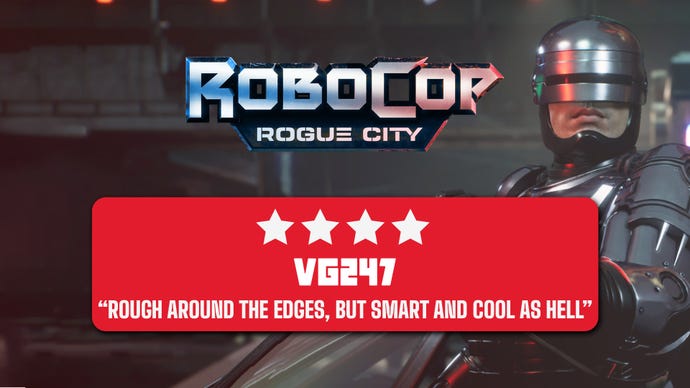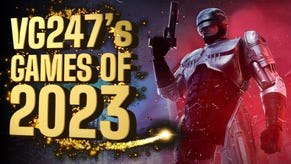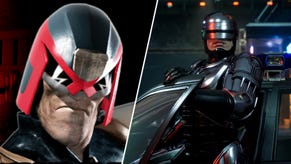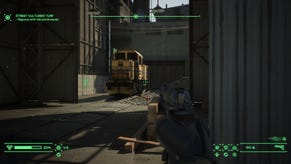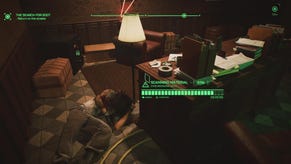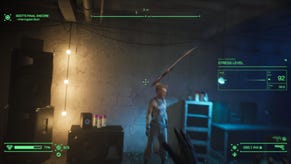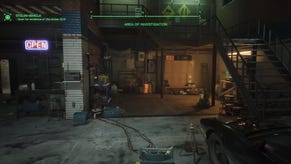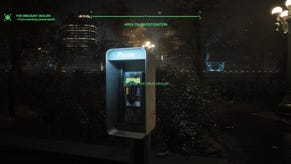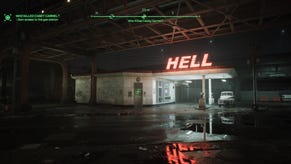Robocop: Rogue City Review - finally, a worthy sequel to the classic film
After decades of diminishing returns, Old Detroit’s finest is back with something to say.
Here’s the deal in a nutshell – Robocop: Rogue City is, much like the film that inspires it, a work made by a brilliant creative team whose ambition frequently collides with the resources available to them. The result is an overall experience that’s infinitely better than it has any right to be: janky, and a little rough around the edges, but nonetheless smart, compelling, and cool as hell.
The beloved 1987 action film Robocop was conceived as a satire of Reagan’s America: imagining the damage that his government shrinkage obsessed administration might do to the country if the ruinous neoliberal doctrine of Reaganomics were allowed to proceed unchallenged for the next few decades. The world it portrays is, as a result, incredibly bleak. Corporations rule over a wasteland of rotting buildings and tent cities in which a police force diminished by endemic mistrust and chronic underfunding is slowly but surely being privatised, militarised, and mechanised. Also, the adverts are f**king mental.
Calling it “prescient” is, quite literally, the understatement of the century: this nightmare vision of America’s future, necessarily directed by a European intellectual, holds up more or less intact in Rogue City as a nightmare reflection of America’s present. Perhaps it takes the outside perspective of a continental European to properly skewer Reagan’s legacy (or Thatcher’s, if they ever fancy making a first person shooter based on Boys from the Blackstuff).

Like with its previous game, Terminator: Resistance, Warsaw based developer Teyon has managed to rescue an 80s cultural phenomenon about cybernetic murder machines from the back of Hollywood’s cupboard, polish off the dulling effect of endless crap sequels and spin-offs, and produce a worthy follow-up that actually understands the appeal, and underlying themes, of the original work. It’s extraordinary that they’ve done this twice, where pulling it off once seems impossible. A niche is a niche, I guess.
But it’s even more impressive here: the Robocop franchise was in even worse shape than Terminator, frankly. At least when Terminator pivoted to TV, it didn’t forget that the robots are supposed to be large and intimidating. By the end of Robocop’s original continuity (sort of) in the Prime Directives TV movies, the actor in the titular suit was barely tall enough to fill it. Munchkin Robocop, admirably portrayed but entirely miscast in the form of Page Fletcher, would not inspire further sequels, having fallen short in more ways than one. Over a decade later, a sleek but poorly conceived remake would flop out of Hollywood’s arse, and since 2014 that appeared to be the end of the matter.
Rogue City slots itself in after the second film, positioning itself as an alternative Robocop 3 in which Peter Weller stayed in the role. Crucially, though, the main differentiator from Robocop 3 is that it isn’t a load of cobblers. This is the world of the original movie: a retro-futuristic 1980s that never ended, in a Detroit that’s on the brink of socioeconomic collapse. You are Alex Murphy, a dead cop who once found himself on the business end of half a dozen shotguns and, instead of being allowed the dignity of retirement in death, was resurrected and put to work by his corporate paymasters as the organic half of Robocop: an Omni Corp product designed to violently uphold the law without doing any of those annoying human things like “sleep” or “unionise” or “require compensation for his time”.
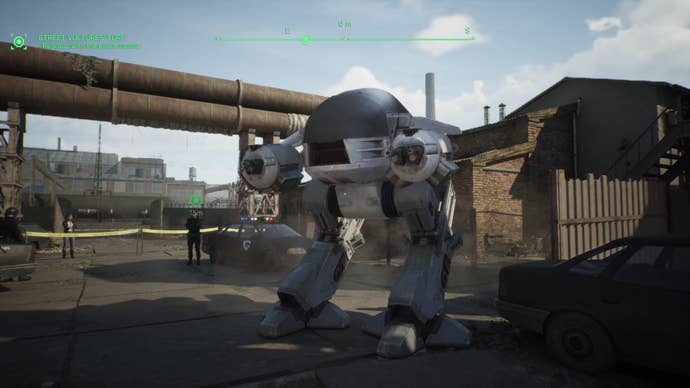
It plays something like Deus Ex: Human Revolution, another game where you play a cyborg running around Future Detroit doing odd jobs for a succession of feckless NPCs. It’s not an open world game, but a linear, mission based experience where the levels are large and full of opportunities to quest and explore away from the main story. As the plot progresses, the scope of these extracurricular activities narrows, mirroring the structure of the film: the game is front-loaded with police work. We get to see Robocop doing regular cop things, which is something rarely glimpsed.
Drug gangs are interfered with. Murders are solved. Graffiti taggers get pinched and told to clear off. But once the Big Bad is established, Robocop makes less time for busywork. As it should be. Although, there’s always stuff to get on with between missions at the old police station, which is like the SSV Normandy except with mankier toilets: a place to chill, hang out with the other officers, and do all the Character Development™ that you can’t do when you’re out shooting creeps in the willy (yes, there is an achievement for that, for the people who keep asking).
It’s a first-person shooter with RPG-lite elements. Questing, conversations, a skill tree, and a suitably Robo-themed take on equipment upgrades (you can install circuit boards in your gun to make it kill better). But there’s nothing here that feels unnecessary: it’s a lean game in all the best ways. Every feature in here is appropriate for the character and setting, there isn’t any egregious box-ticking going on that compromises on its faithfulness to the source. Robocop moves like Robocop, and it’s a bold creative choice: I had to touch the stick sensitivity up a little, and even then it took a while to get used to his sluggish movement. But it’s necessary. Robocop, contrary to that stupid remake, is not supposed to be running marathons and doing Cool Flips. He’s a big, bulky piece of 80s technology. An urban riot tank with all the grace, function, and styling of a top-loading Betamax.
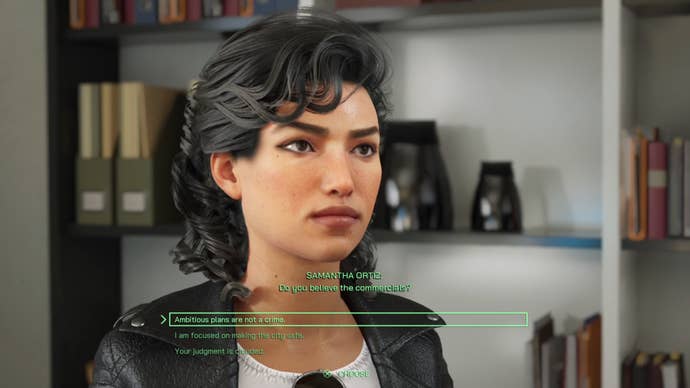
The goal here is to carry on the world, characters, and themes of the first two films in video game form without compromising any part of their popular appeal or artistic truth. In this, Rogue City is an ED-209 roaring success. It features just enough fan service to be enjoyable without being irritating: a mix of familiar elements, faces, places, and situations that are justified within the narrative, but not shoehorned in every two minutes for the Funko Pop crowd.
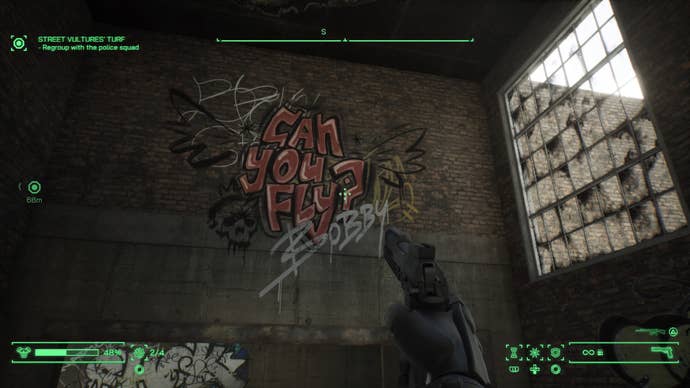
It nails the look and it nails the thrill: the art direction is sublime, and the shooting, while not as precise and polished as a big-budget FPS, is satisfyingly crunchy. Robo can chuck chairs, motorbikes, and giant cannisters of propane at perps as easily as you or I would fling coke cans into a bin. The comic-book violence and machismo of the films translates beautifully into an explodey video game power fantasy to rival any great 7/10 shooter you can think of, up to and including The Darkness 2.
But Murphy’s vulnerability, deftly portrayed by a Peter Weller who still understands the assignment, also survives the transition. His struggle to reconcile the man he was with the machine he has become, his desire to be liked by his colleagues, his sheer humanity that still breaks through to the service despite being imprisoned within 400lbs of hydraulics and ballistic armour.
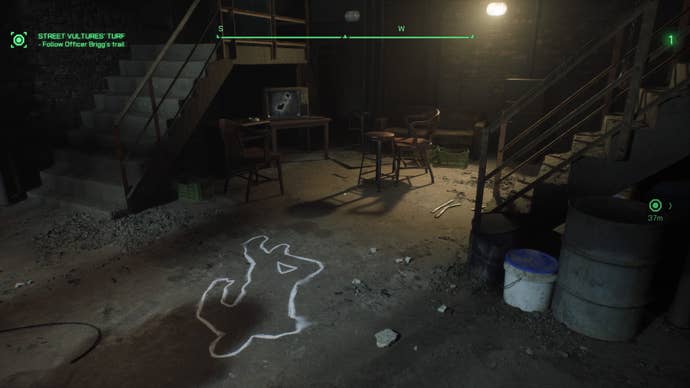
So, as far as being a Robocop Game goes, it’s unsurpassed. Better than I could have ever hoped. Given that Robocop itself was greenlit off the back of The Terminator being a surprise runaway success off the back of the smallest budget it could get away with, it’s fitting that the European studio that made the delectable Terminator: Resistance has worked similar magic here. It’s not perfect: as alluded to earlier, there’s jank aplenty going on here.
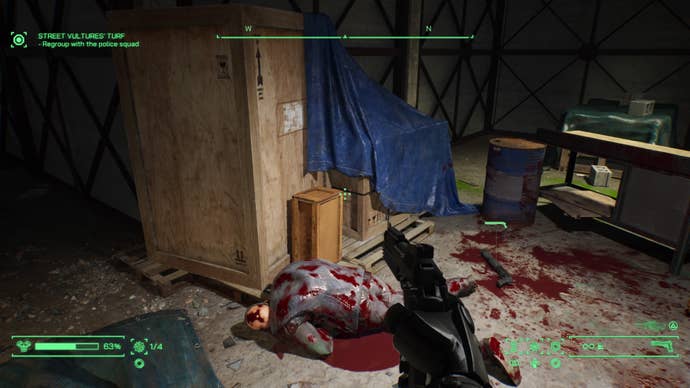
And though it’s running on Unreal Engine 5, it’s just not polished enough to serve as a graphical showcase. The animations are a bit stiff, and everything has that Unreal Shitsheen that seems to require an extra 50m in the budget to scrub off before shipping. There’s also a weird artifacting whenever there’s a camera cut in a cutscene, which is so consistent I genuinely wondered if it was some sort of ill advised artistic choice, or some kind of problem with my PS5’s GPU.
But nope. The only thing malfunctioning around here is the economics of game production. And from that struggle, under circumstances that echo those of the original movie’s troubled production, a brilliant piece of work emerges, that somehow nails every part of the brief and finally proves that Robocop can inspire worthy sequels. And if it didn't look a bit ropey sometimes, I doubt it would feel like Robocop: a stop-motion ED-209 falling down some stairs is goofy as hell, after all, but none of the CGI perfect ED-209s in the 2014 remake ever did anything goofy, and it was crap. So. Y'know.
Play it, creep.
Robocop: Rogue City is out now on current-gen consoles and PC.
